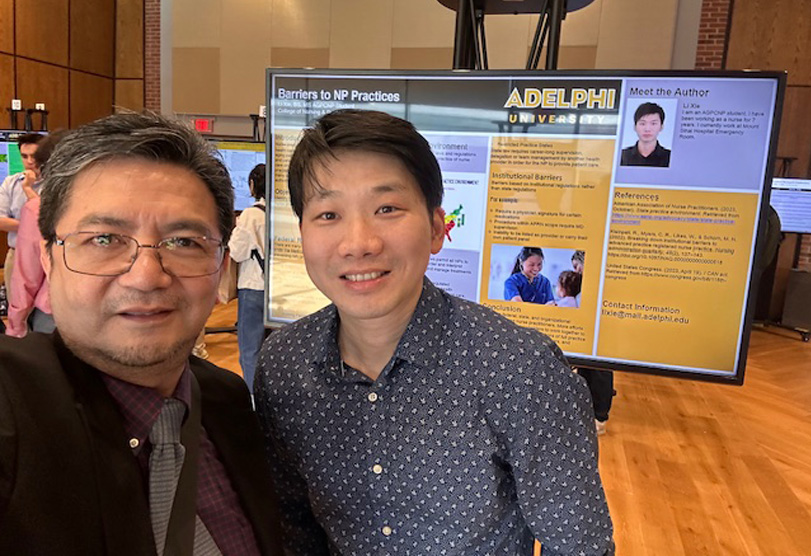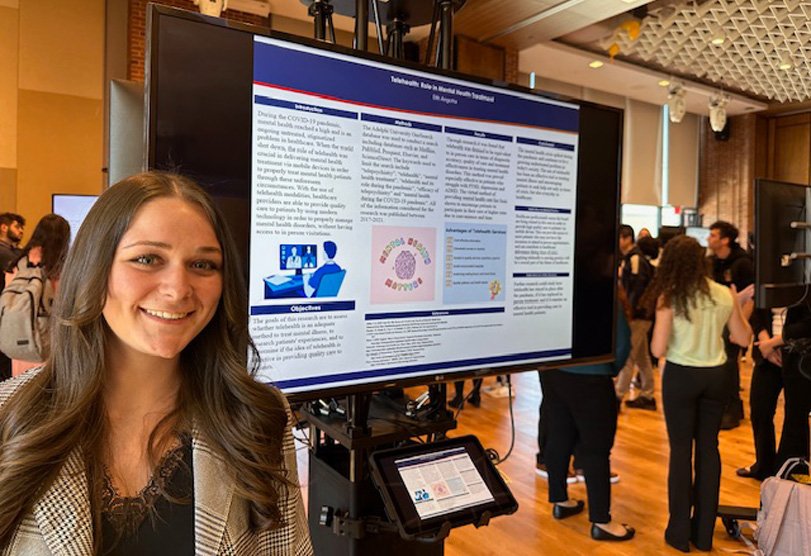
If you ask Edmund J.Y. Pajarillo, PhD, professor in the Adelphi University College of Nursing and Public Health (CNPH), what makes him passionate about research, he will tell you it’s something that has always been within him.
But he also gives a hefty dose of credit for honing this passion where it is due—to the professors and mentors he met on the path to where he is now.
“My desire to explore new ideas was always there, but my love for research took off after being influenced by very knowledgeable and experienced professors when I was pursuing my undergraduate and graduate degrees, and after that, from generous mentors in nursing that I have been privileged to work with,” Dr. Pajarillo said.
Dr. Pajarillo has been teaching for more than 20 years, the last nine of which have been as a faculty member at Adelphi. Prior to this, he honed his expertise through several hands-on roles in the healthcare field, in various specializations and capacities.
“When I was immersed in healthcare settings, the research topics I was drawn to centered on issues I was seeing in my work—mostly related to care of the elderly—from the overuse of psychotropic medications to manage dementia to the care of individuals in the home and those aging in place,” Dr. Pajarillo said. “Since shifting my focus to teaching, my research has also shifted, primarily to topics related to nursing education.”
Dr. Pajarillo’s recent research is centered on improving the educational experience of students studying to become nurses, tackling subjects aimed at turning out well-prepared graduates who will be an answer to the ongoing shortage of nurses and nurse educators. His most recent article, “Addressing the Shortage of Academic Nurse Educators—Recommendations for Educational Institutions Based on Nominal Group Technique Research,” published in April in Nursing Education Perspectives, explores factors contributing to the shortage of academic nurse educators and identifies opportunities to address these factors from the perspectives of nursing education institutions.
As a professor to both undergraduates and graduates in CNPH, Dr. Pajarillo has picked up the baton from the professors who inspired him and strongly encourages his students to conduct research that explores their own ideas. He says it is gratifying to be able to pay forward the mentoring he received from teachers and colleagues.
“Students who value the relevance of research tend to succeed in their careers, as they know they are contributing to the science of nursing, in addition to improving their knowledge and skills in order to provide better, safe, quality care to their patients,” he said. “As a mentor, I try to tailor my involvement to each student’s needs to enable them to achieve their fullest potential.”
Dr. Pajarillo served as mentor to six Master of Science in Nursing students as they conceptualized, developed and presented their own original research at the Adelphi University Scholarship and Creative Works Conference on April 16. He hopes that this will only be the beginning of a lifetime of learning and pushing the frontiers of healthcare forward.
CNPH Student Presentations Explored a Wide Variety of Topics
Dr. Pajarillo’s mentees explored a broad array of healthcare topics that touch on important societal and global issues.
Alberto Ahumada studied the effect of the COVID-19 pandemic on the education of nurses, finding that the challenges of learning during this unprecedented time found new graduates lacking the confidence to practice, and healthcare leadership uncertain about how to support their new hires.

Professor Edmund J.Y. Pajarillo, PhD, with Li Xie, a nursing student mentee, at the Scholarship and Creative Works Conference
“Through this process, I learned that I enjoy helping others and providing valuable insights,” Ahumada said. “This experience has helped me gain a deeper understanding of myself and my aspirations, and I am excited to continue growing and pursuing my goals.”
Li Xie’s research focused on the important role of nurse practitioners (NPs) in providing primary care to all types of patients in different healthcare settings as well as the barriers that prevent them from practicing to their fullest potential, such as federal and state regulations that prevent NPs from exercising their full scope of practice. Xie’s presentation calls on all stakeholders to work together to remove these barriers and lift restrictions on full practice in order to benefit patients.
“Through this project, I’ve learned that there are federal, state and organizational barriers that prevent NPs from full practice authority,” Xie said. “In the future, I will be more involved with policymaking, because it is relevant to our own interests and an opportunity to influence the future of health.”
Xie adds that Dr. Pajarillo was very supportive throughout the entire research process by helping with topic selection, review of abstracts and ePosters, and giving tips on their presentations.

Nursing graduate student Erin Angotta ’20 stands next to her ePoster on telehealth at Adelphi’s Scholarship and Creative Works Conference.
Erin Angotta examined whether telehealth is an adequate method to treat mental illness. For this research, she explored patients’ experiences with telehealth to determine its effectiveness in providing patient care. Angotta found that telehealth was equivalent to in-person care in terms of diagnostic accuracy, quality of care and treatment effectiveness, with the bonus of virtual care having higher participation rates due to convenience and time.
“Being able to share my project at the conference, to me, means that my work has been seen. I’ve learned how important it is to perform research and share it with others to stay up-to-date on advancements in the field and act as an advocate for healthcare workers,” Angotta said. “Professor Pajarillo has been an excellent mentor throughout the semester, always lending a helping hand to ensure that our work represents our diligent efforts.”
Ijeoma Akusobi explored the impact of the overturning of Roe v. Wade, specifically on minority patients and nonprofit healthcare organizations. This research also underscored the role of Advanced Practice Registered Nurses as policy advocates to improve access to reproductive care.
“Researching the impact of abortion bans has ignited a zeal to further my knowledge on threats to women’s reproductive rights. As a future primary care adult-gerontology nurse practitioner, my main goal is to provide preventative and wellness care to vulnerable populations—thus, I am committed to practicing to my fullest authority to ensure I can provide comprehensive women’s healthcare,” Akusobi said. “In the future, I hope to take action and engage in policy work to increase government funding for reproductive care.”
Tjada Garvin conducted a systematic review of existing research on sarcoidosis, a disease of unknown origin that affects multiple body systems and whose cause is assumed to be initiated by an immune response to unknown antigens that leads to the formation of granulomas in the lungs. The review demonstrated the most effective treatments for individuals with sarcoidosis, potentially slowing the progression of long-term illness, preventing complications and improving their quality of life.
“Presenting my oral presentation project at the Scholarship and Creative Works Conference was not only an opportunity to illuminate my research and show my insights and perspectives, it allowed me to connect with other students striving to achieve excellence in their fields so that I could learn from their work and build a supportive network for my academic and professional journey,” Garvin said. “Professor Pajarillo’s guidance and expertise have been invaluable in shaping my research, refining my arguments and enhancing my presentation. His mentorship has not only improved my project but also deepened my understanding of sarcoidosis and boosted my confidence in my abilities.”
Krystle Callan’s research addresses the opioid epidemic, including the many fatalities associated with overdose and accidental deaths and the debate surrounding safe injection sites (SIS), where drug users may be allowed to inject opioids in a safe setting where an experienced professional is present and trained to deal with impending and actual overdoses. Callan’s project examines both sides of the debate surrounding SIS.
“The debate on safe injection sites is surrounded by fear and lack of knowledge, so my presentation gave people the opportunity to form their own opinions,” Callan said. “The process of developing my project opened my eyes to harm-reduction techniques that providers can utilize. I went into it with an open mind and tried to remove any personal bias before researching the topic. Now, among my future goals as a nurse practitioner is advocating for safe injection sites within my community.”
A Full Circle Experience
As Dr. Pajarillo traversed the Scholarship and Creative Works Conference on April 16, he was clearly a proud mentor, having guided so many students to this important showcase of their ideas and research. But he is definitive in saying that the conference was not the end of the journey.
“Mentoring may have a beginning and an end, but the mentoring I experienced throughout my life often turned into the exchange of ideas with professional colleagues and friends,” he said. “Once these students move on to their professional lives, the door is always open to collaboration and discussion because of the commitment we share in the healthcare field.”